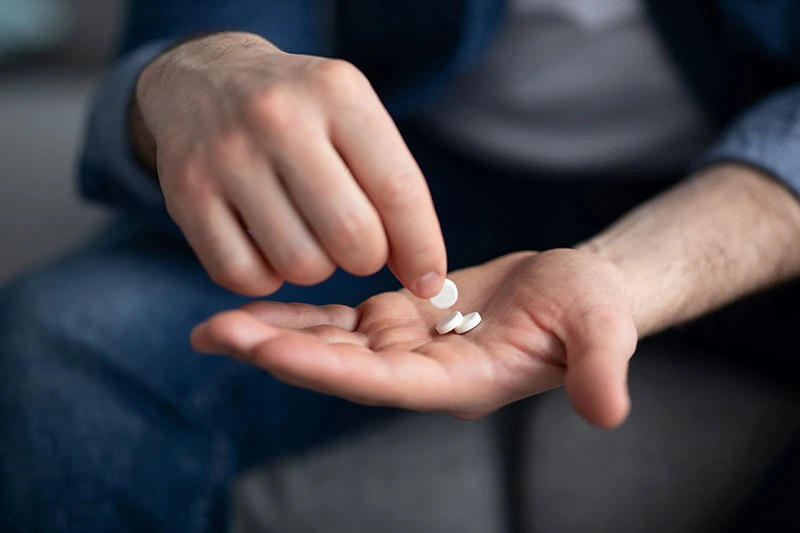Addiction looks different at different stages, so it’s important that you are able to spot the signs of addiction in yourself or a loved one. Most people think of an addiction at its worst stages, someone who cannot take care of themselves, maybe living on the streets, using every penny they can find on another hit.
However, there are several stages that people will go through before that point, and many won’t ever reach such an extreme scenario. That does not mean that their addiction isn’t legitimate, nor does it mean that you can’t get help if you haven’t reached this stage.
You can get help at any time when you spot any of the signs of addiction in yourself.

Spotting Signs of Addiction in Yourself (Or a Loved One)
Addiction can be difficult to spot in yourself, especially compared to recognizing the signs and a loved one.
The most common signs that people know about are things like:
- Missing work or school because of drug or alcohol use to the point that it causes problems
- Issues with relationships, such as neglecting family responsibilities because of using, recovering from, or obtaining drugs and alcohol
- Financial issues when money allocated for bills or food is spent on drugs and alcohol instead
- Paraphernalia around the house with noticeable changes in behavior, mood, eating, and sleeping
However, the signs of addiction in yourself or others can be more insidious, especially when an addiction is first beginning.
“I’ll just have one more drink/hit.”
If you have ever said this to yourself, it might be the start of an addiction. During the beginning stages of an addiction, you undergo what is called tolerance or dependence, where your body starts to become physically dependent on a substance because you have developed a tolerance to it.
The same happens for things like sugar, salt, and even regular over-the-counter medication, but drugs and alcohol can have a much more profound effect long-term.
Many people who are struggling with tolerance may not know it, but they know that they need one or two more hits or just a few more drinks to get the same feeling they had the night before.
“I can stop at any time.”
It is not uncommon for people who are starting out with tolerance, dependence, and a low-grade addiction to believe that they can stop at any time. What’s more, they tell themselves and others that they can stop at any time.
This is often not true and more to the point, if you are thinking to yourself or telling other people that you are completely in control and you can stop at any time, chances are you are doing this in an attempt to lie to yourself or others and deep down you know that you don’t have as much control as you would like.
“It’s not really that bad.”
Similarly, this is when you might tell yourself or others that it’s really not that bad. You might tell yourself that your addiction couldn’t possibly be so bad because you still have a job, you are still managing your family, and you haven’t ‘hit rock bottom’ as they say, nor have you dealt with severe repercussions from addiction.
You might use examples from TV or other people you know to justify that your circumstances aren’t as bad as theirs and, therefore, you don’t really have an addiction.
“I shouldn’t do this again.”
Then, as the tolerance continues and you develop an addiction, you’ll start to realize deep down that you shouldn’t do it anymore.
This is when you notice the negative repercussions that are happening as a result of your behavior. You may or may not yet admit to yourself that you have an addiction, but you will admit that you should probably stop because things are getting out of hand or having a detrimental impact on your life.
“I want to stop, but I can’t whenever I try.”
Then you reach the stage where you know you shouldn’t do more drugs or spend more money on alcohol or go out with certain friends, but whenever you try to stop or reduce how much you are using, you can’t do it.
You tell yourself that you are done, and you try to quit, but the cravings are too strong, and you end up going back time and time again.
Getting Help for Addiction
These are the less common signs, but they are signs of addiction in yourself or others that are very important to recognize.
At any point when you are struggling with these symptoms, you can reach out for help.
At Ritual Recovery we offer addiction treatment in Asheville that provides a luxury rehab opportunity with a flexible outpatient schedule. At our treatment center we specialize in every level of outpatient care including partial hospitalization programs, intensive outpatient programs, and access to sober living.
Our team specializes in drug and alcohol rehab programs as well as dual diagnosis programs for those with co-occurring mental health disorders.
Reach out to our team today at 866-530-5836 to get help with your signs of addiction.



